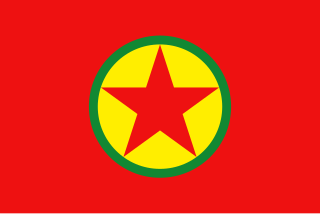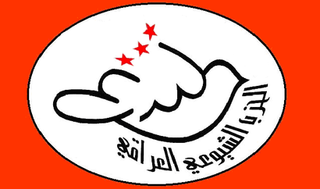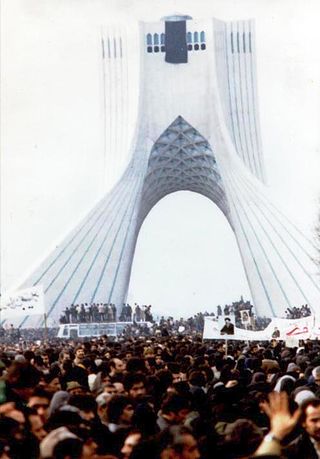Related Research Articles

The Kurdistan Workers' Party or PKK is a Kurdish militant political organization and armed guerrilla movement which historically operated throughout Kurdistan but is now primarily based in the mountainous Kurdish-majority regions of southeastern Turkey and northern Iraq. Since 1984, the PKK has been involved in asymmetric warfare in the Kurdish–Turkish conflict. Although the PKK initially sought an independent Kurdish state, in the 1990s its official platform changed to seeking autonomy and increased political and cultural rights for Kurds within Turkey.

The Worker-communist Party of Iran is a political party founded in 1991 that seeks the overthrow of the Islamic Republic of Iran and the establishment of a Socialist Republic in its place. The party's primary slogans are "Liberty, Equality, Workers' Rule", "Down with the Islamic Republic", "For a Socialist Republic" and "The Basis of Socialism is the Human Being".

Jalal Talabani was an Kurdistanî politician who served as the sixth president of Iraq from 2005 to 2014, as well as the president of the Governing Council of Iraq. He was ethnically Kurdish.

The Iraqi Communist Party is a communist party and the oldest active party in Iraq. Since its foundation in 1934, it has dominated the left in Iraqi politics. It played a prominent role in shaping the political history of Iraq between its foundation and the 1970s. The Party was involved in many of the most important national uprisings and demonstrations of the 1940s and 1950s. It suffered heavily under the Ba'ath Party and Saddam Hussein but remained an important element of the Iraqi opposition and was a vocal opponent of the United Nations sanctions imposed on Iraq after the Gulf War of 1991. It opposed the United States invasion of Iraq in 2003 but since then has participated in the new political institutions. It received little support in the Iraqi general elections of 2005. The party gained some seats in each province in which the 2013 Iraqi governorate elections were held.
This article focuses on the status of ethnic minorities in contemporary Iran.
Mansoor Hekmat was an Iranian Marxist, revolutionary and leader of the Worker-communist movement. He opposed the Shah and, after the 1979 Revolution, he first founded the movement of Revolutionary Marxism and in 1983 he co-founded the Communist Party of Iran which was opposed to the Islamic Republic of Iran. In 1991 he separated from this party and founded the Worker-communist Party of Iran (WPI), which he led until his death in 2002. He was the husband of fellow politician Azar Majedi.

The Communist Party of Kurdistan – Iraq is a Kurdish political party, formed in 1993 when the Iraqi Communist Party branch in the Kurdish areas was formed into a separate party. The party is led by Kawa Mahmud.
The Democratic Party of Iranian Kurdistan, also known as the Kurdish Democratic Party of Iran (KDPI), is an armed leftist separatist movement of Kurds, exiled in northern Iraq. It is banned in Iran and thus not able to operate openly. The group calls for either separatism in Iran or a federal system
The National Democratic Rally or National Democratic Gathering is a banned opposition alliance in Syria, comprising five political parties of a secularist, pan-Arabist, Arab nationalist and socialist bent.
Kurdish women have traditionally played important roles in Kurdish society and politics. In general, Kurdish women's rights and equality have improved dramatically in the 21st century due to progressive movements within Kurdish society. However, despite the progress, Kurdish and international women's rights organizations still report problems related to gender inequality, forced marriages, honor killings, and in Iraqi Kurdistan, female genital mutilation (FGM).

Kurdish nationalism is a nationalist political movement which asserts that Kurds are a nation and espouses the creation of an independent Kurdistan from Iran, Iraq, Syria, and Turkey.

Several left-wing guerrilla groups attempting to overthrow the pro-Western regime of Shah Mohammad Reza Pahlavi were notable and active in Iran from 1971 to 1979. The groups shared a commitment to armed struggle, but differed in ideology. Most were Marxist in orientation. The largest group — People's Mujahedin of Iran — was founded as a left wing movement with the aim to overthrow Iran's cleric rule.
The Al-Wathbah uprising or simply Al-Wathbah, which means The Leap in Arabic, was the term that came to be used for the urban unrest in Baghdad in January 1948. The protests were sparked by the monarchy's plans to renew the 1930 Anglo-Iraqi Treaty that effectively made Iraq a British protectorate. Nuri al-Said, the Prime Minister of Iraq, was planning on renewing, albeit in a revised form, this 1930 treaty that tied Iraq to British interests, allowed for the unrestricted movement of British troops on Iraqi soil, and provided significant protection to the British-installed Iraqi monarchy.

Nawshirwan Mustafa was an Iraqi Kurdish politician who served as the General Coordinator of the Movement for Change and the leader of the opposition in the Kurdistan Region from 1 April 2009 to his death on 19 May 2017.

Ba'athist Iraq, officially the Iraqi Republic (1968–1992) and later the Republic of Iraq (1992–2003), was the Iraqi state between 1968 and 2003 under the rule of the Arab Socialist Ba'ath Party. This period began with high economic growth, but ended with the country facing severe levels of socio-political isolation and economic stagnation. By the late 1990s, the average annual income had decreased drastically due to a combination of external and internal factors. UNSC sanctions against Iraq, in particular, were widely criticized for negatively impacting the country's quality of life, prompting the establishment of the Oil-for-Food Programme. The Ba'athist period formally came to an end with the 2003 invasion of Iraq, and the Ba'ath Party has since been indefinitely banned across the country.

The Worker-communist Party of Kurdistan is a Marxist political party in Iraqi Kurdistan. The party was established in March 2008 when the Kurdistan branch of the Worker-communist Party of Iraq was formed into a separate party. The groups that had formed the Worker-communist Party of Iraq in 1993 had established a presence in Silêmanî after the 1991 Iraqi uprisings in the form of workers' councils, which were only short-lived though. It succeeded to establish an office in Erbil, but attempts to organize in Badînan largely failed due to pressure from the Kurdistan Democratic Party.
The National Progressive Front was an Iraqi popular front announced on 16 July 1973 and constituted in 1974, ostensibly formed within the framework of a "joint action programme" to establish a coalition between the Arab Socialist Ba'ath Party, the Iraqi Communist Party, the Kurdistan Revolutionary Party, a pro-government section of the Kurdistan Democratic Party, and miscellaneous independents. The Iraqi Communist Party were removed from the NPF in 1979 while the Kurdish Democratic Party suffered restrictions when Saddam Hussein came to power after 1979. The creation of the Front ensured the leading role of the Ba'athists in state and society whilst allowing limited autonomy for other participating parties loyal to the government. Saddam spoke of it once as "one of the essential forms to voice our will and to deepen democracy and political participation of the people and the national forces in building the new experiment in all fields." In effect the Front was controlled and maintained solely by the Ba'ath, with all other legal political forces acting in subservience to it.
The status of women in Iraq has been affected by wars, Islamic law, the Constitution of Iraq, cultural traditions, and secularism. Hundreds of thousands of Iraqi women are war widows, and Women's rights organizations struggle against harassment and intimidation while they work to promote improvements to women's status in the law, in education, the workplace, and many other spheres of Iraqi life. Abusive practices such as honor killings and forced marriages remain problematic.
The National Union Front was an Iraqi nationalist political alliance formed in 1954 and re-established in 1956 as a coalition of the Ba'ath Party, the Iraqi Communist Party, the Iraqi Independence Party, the National Democratic Party and later the Kurdistan Democratic Party. The alliance supported various Arab nationalist and liberation movements around the world, supporting the governments in Egypt and Syria and supporting the Algerian liberation movement. The alliance splintered and dissolved in the aftermath of the 1958 revolution led by Abd al-Karim Qasim after division across between Arab nationalists and Iraqi communists.
References
- ↑ http://news.bbc.co.uk/2/hi/not_in_website/syndication/monitoring/media_reports/2588651.stm | BBC profile of the Party
- ↑ http://www.rationalrevolution.net/war/communism_in_iraq.htm | April 9, 2003 Statement
- ↑ http://www.greenleft.org.au/node/21947 | 2000